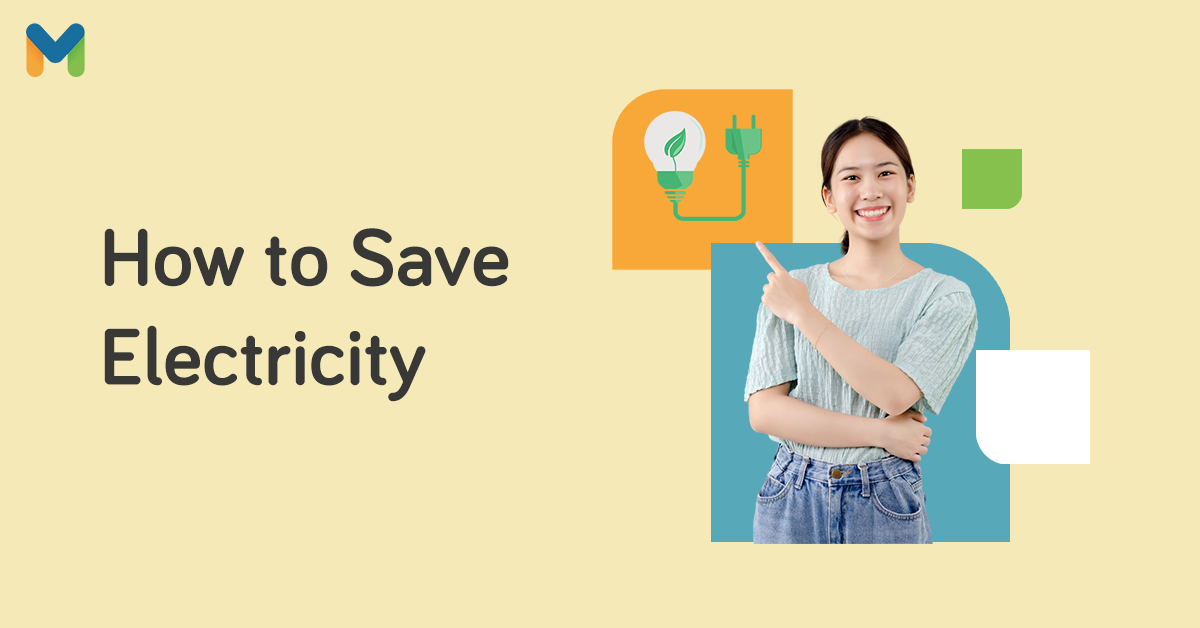In a tropical country where temperatures can easily hit over 40°C during summertime, it’s easy to rack up a huge electric bill. Naturally, if you’re using your AC unit and other power-hungry appliances all throughout the summer, this trend will continue to dig a hole in your wallet until the rainy season comes. How exactly can you survive this heat without breaking the bank? Fear not, because here are some helpful power saving tips for the summer you should check out.
10 Helpful Power Savings Tips for the Summer
Use natural light and energy-efficient bulbs

It’s time to get closer to nature by relying on sunlight as your main light source. It is best to reposition your furniture and appliances so the sun doesn’t glare up on anything with a screen. And when the night falls, it’s time for your energy-efficient bulbs to shine, literally. Use light emitting diode (LED) bulbs since they consume way less energy and last longer than most. On the cheaper side, get compact fluorescent (CFL) bulbs that are energy-efficient and bright enough to replace outdated incandescent lamps.
Avoid using large air-conditioning units
It’s true that larger AC units will cool your home faster, but they also consume way more power. According to the Meralco’s energy calculator on their mobile app[1], using a 2.5 HP AC unit for eight hours a day, seven days a week will cost you around PHP 1,200 per month while a 1.5 HP unit will only cost at least PHP 600. Sure, the smaller one will take longer to cool a room, but at least it won’t burn your wallet every month. Also, check out AC units equipped with an inverter that cools a room quickly and operates at lower speeds for added savings.
Stock your fridge with enough necessities

Your refrigerator eats up at least 20 percent of the entire household’s electricity usage. Frequently opening your fridge tends to spike your bill because it consumes energy to cool down the warm air it received from your kitchen. So it’s not really ideal to leave the fridge almost empty because it allows more warm air to enter. Avoid this by stocking your fridge with necessities like bottled water in the freezer and perishable goods on the lower shelves. Keeping your fridge well-stocked allows for better air circulation.
Unplug all unused or rarely-used appliances
You’ve been told in the past that simply turning off your appliances will stop the flow of electricity, saving more money on your electric bill. It’s time to bust the myth that appliances don’t draw power when they are turned off. They are still running on standby mode. Your appliances still consume a small amount of electricity as reserve energy for the next use. Basically, anything that is plugged into an outlet will consume power, regardless if it’s running or not. Unplug all appliances not in use to truly conserve energy.
Read more: Working from Home? Take Note of These Home Energy Saving Tips
Use a power board or extension cord

Power boards are more commonly known as extension cords. Using a power board is so convenient because it can provide electricity to several appliances at the same time. It also provides your home with a centralized power source. Now you only need to turn off or unplug one device to save a whole lot on next month’s bill. Just make sure you don’t overload your power boards by plugging in way too many appliances. Avoid following bad electrical practices like the octopus connection to prevent electricity hazards[2].
Clean and maintain essential appliances
Keeping your oven toasters, electric fans, televisions, and other appliances clean and well-maintained is key to ensuring that they perform at peak efficiency. Dirt and oil buildup can cause your appliances to overheat and consume more electricity in the process. Keep this up and they will eventually stop working altogether, forcing you to spend more money on new ones. Be more diligent in cleaning and maintaining your essential appliances, especially the more expensive ones like your computers and game consoles.
Switch from gas range to induction cooker

You might wonder why an appliance that actually consumes electricity is more efficient than a gas range. That’s because a gas range releases more heat than an induction cooker which raises the room temperature in your home. This means more hard work and power consumption for your cooling appliances. Induction cookers[3] transfer 82% of the heat directly to the cooking vessel, beating the efficiency of a gas range that leaks 64% of heat. But if you’re not using an AC to cool your home, feel free to keep your reliable gas range.
Rethink the way you do your laundry
It’s time to get creative when it comes to laundry, one of the most energy-consuming activities in a household. If you’re using a washer/dryer combo, stop it once it’s done the final drain cycle to save electricity. You probably don’t need to use your dryer because the scorching heat of the summer season can dry your clothes in under an hour, so that’s more savings for you. If you’re in the market for a new washing machine, check out the front-loading ones because they power down faster and use less electricity to spin your clothes.
Read more: Beat Inflation: Tips to Maintain Your Household Budget
Give your appliances some space

It’s time for some rearranging! Always remember to space out your appliances from one another. Aside from making your home look orderly, spacing your appliances will prevent them from accumulating heat in one area and creating a potential fire hazard. For example, it’s best to keep your refrigerator at least four inches away from a wall while computer towers should be placed two inches away from the wall. Also, since cold air tends to travel downward, position your AC unit on a higher platform for a cooler room temperature.
Step up your energy-saving game
This summer, it’s time to step up and maximize your savings by taking control of your electric bill. For better power management, download apps like the Meralco app to help you calculate and control your energy consumption for the month. The next time you shop for a new appliance, check its Energy Efficiency Factor[4] (EEF) tag that denotes their power consumption and efficiency ratings. A high efficiency rate means the appliance consumes less power, making it a great buy.
Read more: Senior Citizens Can Get Discounts on Utility Bills
Final Thoughts
Before you turn up your AC unit to its maximum cooling capacity, remind yourself that you’ll be paying for it big time when the next month’s bill arrives. Being energy-efficient doesn’t mean you will deprive yourself of comfort in this season of intense heat. It just requires you to be more creative in using your appliances and taking advantage of the scathing weather. Summertime can be fun, comfortable, and inexpensive all at the same time—as long as you’re willing to put in the work.
Sources:










